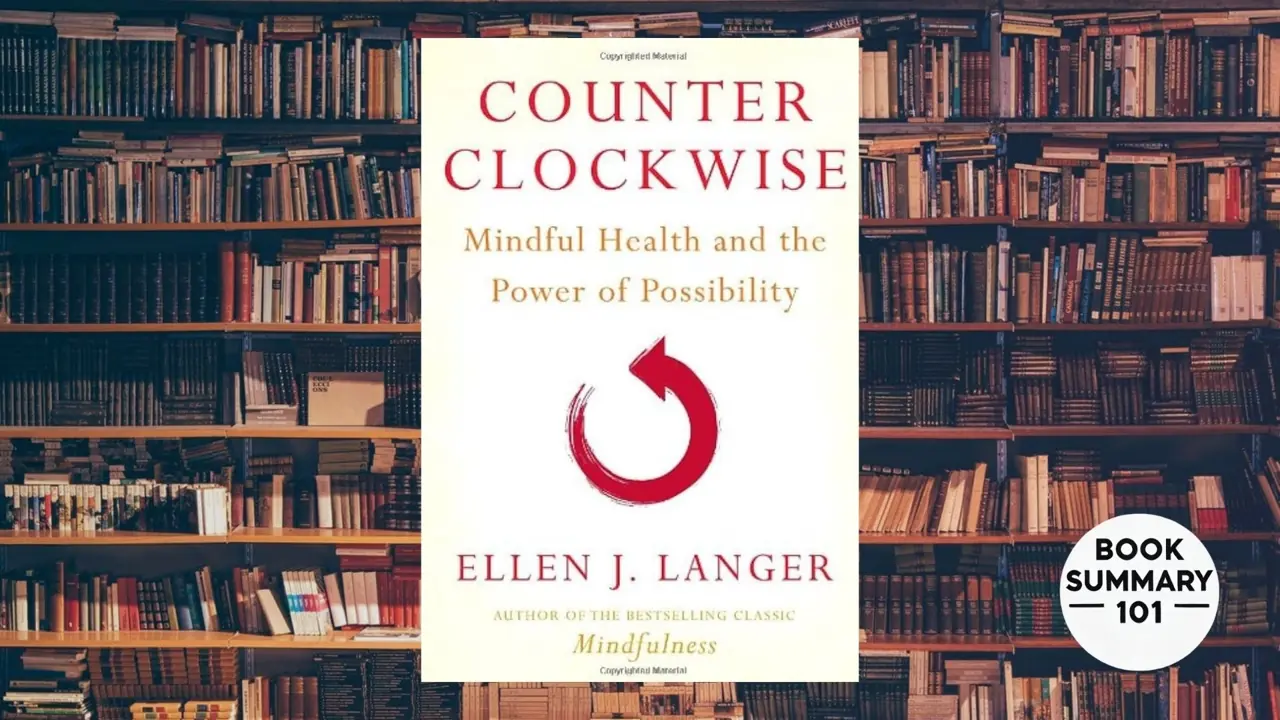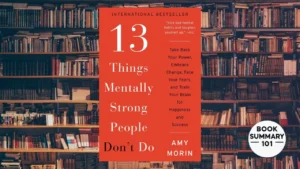What if I told you that the way you think about aging, illness, and health could actually change your reality? Ellen J. Langer’s Counter Clockwise: Mindful Health and the Power of Possibility is a mind-blowing exploration of how shifting our perceptions can transform our physical and mental well-being. Intrigued? Let’s dive in!
Why Read This Book?
Life is full of challenges—stress, health concerns, and the nagging feeling that getting older means slowing down. But what if that’s just a story we’ve been telling ourselves?
Ellen Langer, a social psychologist often called the “Mother of Mindfulness,” flips conventional wisdom on its head in this book. She shares groundbreaking research showing that our minds and bodies are far more connected than we think—and that by becoming more mindful, we can unlock incredible possibilities for healthier, happier lives.
This isn’t just another self-help book. It’s science-backed, filled with real-life experiments and practical advice you can actually use.
The Big Idea
At its core, Counter Clockwise challenges the fixed narratives we have about aging, illness, and even what’s possible for our lives. Langer argues that:
- Our expectations shape our reality. Think you’re “too old” to learn something new or recover from an injury? That mindset alone could be holding you back.
- Being mindful can make us healthier. Langer’s approach isn’t about meditation or yoga; it’s about paying attention to the present moment and questioning rigid beliefs.
- Small changes can have huge effects. From tweaking your environment to embracing uncertainty, little shifts can create ripples that transform your life.
Mind-Shift Moments: What This Book Taught Me
Langer’s work is transformative because it connects simple shifts in thinking to profound changes in our lives. Let’s dive deeper into the main lessons you can apply to your own journey toward better health, happiness, and fulfillment.
Mindfulness Isn’t Just About Meditating
When you hear the word “mindfulness,” you might picture sitting cross-legged, eyes closed, focusing on your breath. That’s great, but Langer’s version is much more accessible and practical for daily life.
Mindfulness, according to Langer, is about being actively engaged in the present moment. It’s about noticing things you’ve never paid attention to before and questioning the assumptions you’re carrying around without realizing it.
For example:
- When you’re stuck in traffic, do you immediately think, This always happens to me? Instead, could you explore the moment with curiosity? Maybe noticing the song on the radio, the color of the sky, or even practicing gratitude that you’re not rushing to an emergency.
- Or, when facing a health challenge, do you assume it will get worse because of your age? Instead, ask yourself, What can I do today to feel better, no matter how small?
Mindfulness isn’t about trying to control the future or obsessing over the past—it’s about finding fresh perspectives in the now.
Your Beliefs Are More Powerful Than You Think
What you believe doesn’t just shape how you think—it shapes how your body responds. Langer’s research proves that expectations can directly impact physical health.
Here’s an example: If you believe aging means inevitable decline, you might avoid activities you think are “too hard” for someone your age. Over time, this belief becomes a self-fulfilling prophecy because inactivity actually accelerates aging.
But what if you flipped that narrative? Studies have shown that people with a positive attitude toward aging not only live longer but also have fewer chronic illnesses.
This takeaway encourages you to challenge every “rule” you’ve ever internalized about your body, your limits, or your future. Start asking questions like:
- Is this belief helping or hurting me?
- Who says I can’t learn to dance, run a marathon, or start a new career at my age?
Small Changes Can Lead to Big Results
One of the most fascinating aspects of Counter Clockwise is how minor adjustments in perspective or environment can create dramatic shifts. You don’t have to overhaul your entire life to see benefits—tiny tweaks can ripple outward.
Let’s revisit the “Counterclockwise Study.” The elderly participants didn’t receive groundbreaking medical treatments or intense fitness regimens. They simply lived in a space that encouraged them to act and think as if they were younger. This subtle environmental cue led to improved health markers like strength, flexibility, and cognitive sharpness.
What small change can you make today?
- Reframe your self-talk. Replace “I can’t do this” with “I’ll try and see how it goes.”
- Revisit old passions. Loved playing guitar or painting as a kid? Pick it up again—it might spark joy and a sense of vitality.
- Change your surroundings. Rearrange a room, add fresh flowers, or hang up photos that remind you of vibrant, happy times.
Question Everything—Especially Fixed Narratives
Langer’s work challenges us to push back against societal norms and “rules” that often go unquestioned. These rules shape how we behave, sometimes in ways that limit us unnecessarily.
Take aging as an example. How often do we hear phrases like:
- “Older people can’t keep up with technology.”
- “You slow down as you get older.”
- “It’s normal to forget things after 50.”
Instead of accepting these statements as fact, Langer invites you to ask, Is this true for me? Often, you’ll find that these “truths” are more like habits of thought—ones you’re free to break.
And it’s not just about aging! You can apply this questioning to other areas of your life:
- Health: “Does everyone with this condition have the same outcome, or can I be the exception?”
- Work: “Do I really need to stick with this career, or is it okay to explore something new?”
- Relationships: “Am I stuck in this dynamic, or could things improve with a shift in how I approach it?”
Your Body Listens to Your Mind
One of the most empowering takeaways from Counter Clockwise is that your body is far more responsive to your thoughts than you might realize. This doesn’t mean you can wish away every health issue, but it does mean your mindset matters.
For instance, if you approach exercise as a chore, your body might react with tension and resistance. But if you see it as play—dancing, walking in nature, or trying something fun like pickleball—you might feel energized instead of drained.
Langer’s studies suggest that even subtle shifts in how you label experiences—calling work “exercise,” seeing challenges as “opportunities,” or reframing a cold as “temporary downtime”—can impact how your body reacts.
The Bottom Line
Stop living on autopilot. Your beliefs, mindset, and even small everyday choices can shape your reality. By questioning old narratives, embracing mindfulness, and making tiny adjustments, you can unlock a healthier, more vibrant version of yourself.
So, where will you start? What’s one belief you could challenge today?
Real-Life Examples from this book
- The “Counterclockwise Study”
Imagine a group of men in their 70s and 80s spending a week in a retrofitted 1959 environment, complete with music, newspapers, and TV shows from that year. They were encouraged to act as though it was 1959. By the end of the week, they showed measurable improvements in strength, vision, posture, and even cognitive abilities. Why? Their bodies followed their minds’ cues to feel younger. - The Hotel Maids Study
Langer and her team informed hotel maids that their daily work was equivalent to exercise. Without changing their routines, these women saw significant health benefits—including weight loss and reduced blood pressure—simply because they believed they were exercising. - Placebos and Possibility
Ever heard of the placebo effect? Langer expands on this, showing how expectations and beliefs about treatments often matter as much as the treatments themselves.
Why This Matters to You
Maybe you’ve been feeling stuck, weighed down by stress or doubts about your own potential. Counter Clockwise is an empowering reminder that you’re not as limited as you might think. What if the barriers you’re facing are more mental than physical?
This book teaches you how to embrace uncertainty, question “truths” you’ve always taken for granted, and see challenges as opportunities for growth.
Join the Conversation!
Have you ever experienced a “mind over matter” moment? Maybe you noticed how a positive attitude helped you heal faster or how a small mindset shift transformed your day.
Let’s talk about it! Drop your thoughts in the comments below—I’d love to hear your take on Ellen Langer’s ideas or any personal stories you’d like to share.
5 powerful quotes from Counter Clockwise
“When people are not in the moment, they’re not there to know that they’re not there.”
— A reminder that so many of us are living on autopilot. Simply noticing what’s around you can begin to shift everything.
“It is not primarily our physical selves that limit us but rather our mindset about our physical limits.”
— One of the core truths of the book. So often, it’s not our bodies that stop us—it’s the stories we’ve been told about them.
“Wherever you put the mind, the body will follow.”
— Your thoughts have the power to lead your body into healing, growth, and even rejuvenation.
“We do not react to the world as it is. We react to the world as we expect it to be.”
— Our expectations color every experience. Change your expectations, and you change your reality.
“Possibilities exist only in the present.”
— A beautifully simple truth. All change begins with paying attention to what’s happening right now.



